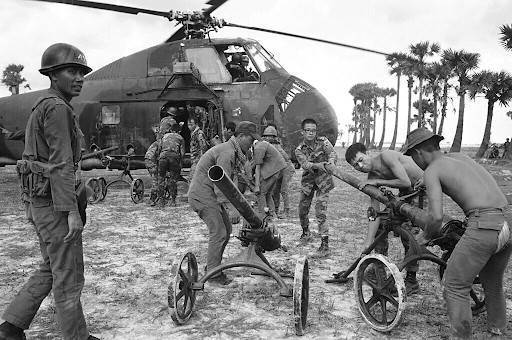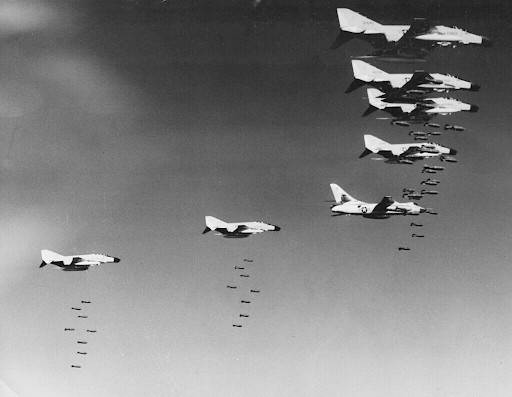Should the United States ever have gone to war in Vietnam? Nearly fifty years after the last American troops were withdrawn from Vietnam, the debate still rages. Michael Hauben, who was on the ground in Vietnam as part of the Office of Civil Operations and Support (Civil Operations and Revolutionary Development Support or CORDS), had a first-hand perspective on this debate.
In Hauben’s view, the United States actually could have helped South Vietnam win the war if only it had kept up its air support. Political considerations hedged the decision to stay or leave Vietnam; for the presidential party in power (which in this case was the Republicans under Nixon) it was only hurting its electoral chances since public opinion had clearly swung against a military presence in Vietnam.
Hauben also strongly disagreed with the notion that the U.S.’s Vietnamese allies lacked the motivation to fight for themselves. To the contrary, Hauben argued that many South Vietnamese truly wanted independence from the North, in part due to ethnic differences between North, Central, and South Vietnamese. Hauben gives several specific examples of situations in which the Vietnamese held their ground militarily against the communists.
Hauben shared a unique experience he had in Vietnam in 1974, after the U.S. military had already withdrawn all of its troops. A politico-religious movement known as “The People’s Anti-Corruption Movement” began after a North Vietnamese priest, Father Thanh, began speaking out against the Thieu government in South Vietnam. Thanh was being advised by Duong Minh Kinh, a South Vietnamese assemblyman. Hauben wanted to speak to Kinh, and for some reason he was the only American with whom Kinh would speak. Hauben met with Kinh in his barren house in the slums of Saigon, and Kinh revealed to him that he was a communist and tried to convince him that the communists would do much better at running the country than the Thieu regime in South Vietnam, which allowed “chaos” and “anarchy” to break out in the streets of Saigon. Hauben, stunned by this development, wrote a report about his meeting which ended up being sent to Washington and ensuring his job security at a time when most U.S. personnel had already been withdrawn from Vietnam.
Michael Hauben’s interview was conducted by Charles Stuart Kennedy on January 26, 2021.
Read Michael Hauben’s full oral history HERE.
Read more about the Vietnam War from the perspective of a diplomat HERE.
To learn more about CORDS click HERE.
Drafted by Ivan Plante
ADST relies on the generous support of our members and readers like you. Please support our efforts to continue capturing, preserving, and sharing the experiences of America’s diplomats.
Excerpts:
“I felt very strongly that it was a fight worth fighting.”
U.S. Role in Vietnam War
HAUBEN: Well, I felt very strongly that it was a fight worth fighting. I also felt it was one that could have been won by our side, but that we did pull the rug out from under our Vietnamese allies. I think that, as opposed to the decision that we had made in Korea, to hold the line there against communism, patently we made the opposite decision in Vietnam; we were not going to stay there no matter what. Right? Because domestic politics being what it is, there was no way that the people that ran the country would have left us there. That would have benefited the other party, the other party at the time being the Democrats who were the peace party. Anyway, Republicans were viewed as the war party. My feeling was there was no question, the war could have been won. But the Vietnamese could not do it without U.S. air support. You would have needed strategic bombing, and you probably would have needed tactical air support as well. By that time, by the summer of 1973, Congress had forbidden that. You couldn’t do air operations or any kind of operations anywhere over or in Indochina, or offshore—couldn’t do it.
So having lived through the 1972 offensive, when a crucial role was played by U.S. air support, I could say, yes, with that support the Vietnamese held on the ground. They held on the ground. They didn’t, by the way, hold everywhere. There are certain areas that they abandoned and relinquished to the enemy in 1972—a strip along the Laotian and Cambodian borders. The country was not overrun. Our Vietnamese kept them from pushing on from An Loc through Region Three to the center of gravity, Saigon. They could not have held without U.S. air support, and B-52s were used to provide tactical air support. You would have needed that later on for the country to have survived. Our Congress, in its infinite wisdom, eliminated that possibility.
“So they fought, even though no one in their right mind would have thought that there was a chance that they would win.”

On Vietnamese allies’ willingness to fight
HAUBEN: So there was always this question mark: will they fight? Well, that wasn’t really resolved until 1975. There were areas that were abandoned in 1972. Let’s face it—although that abandonment was not a retreat under fire, but a rational pulling back to defend the more thickly populated areas as an overextended Army of the Republic of Vietnam (ARVN) just didn’t have the troop strength to be everywhere. However, later on, in the 1975 offensive, those units that were well led, fought well. They fought until they were ground down by attrition. General Lê Minh Đảo, that remarkable general, led the 18th ARVN division and some associated units, including ARVN Airborne, and they actually held the communists off at Xuân Loc, which is east of Bien Hoa and Saigon. They held them there until so many communist troops were committed to the battle that they just ground the South Vietnamese down. They literally ground them down through attrition, and then proceeded on toward Saigon.
Those troops held their ground, for God’s sake. Yes, they were willing to fight. And you had RF battalions sometimes coalesced into regiments, which was, you know, haphazardly done at the last minute—but anyway, you did have examples of well led RF battalions in various provinces that held off North Vietnamese Army regiments in that 1975 offensive. So they fought, even though no one in their right mind would have thought that there was a chance that they would win. They still held on, amazingly. I was surprised.
“This guy actually told me that he was a communist. It was incredible, and that report really ensured my career.”
Candid Conversation with a Covert Communist: In 1974, a communist agitation propaganda effort was undertaken. The propaganda operation had to do with a Roman Catholic priest, a Father Thanh, of North Vietnamese origin, preaching against the Thieu government. The issue fastened upon was corruption, and his movement was dubbed, “The People’s Anti-Corruption Movement.” The embassy erroneously reported that as opposition from the right. Well it wasn’t from the right. Father Thanh’s political adviser was a member of the National Assembly named Duong Minh Kinh. He was someone we wanted to talk to. The movement staged demonstrations and near riots, you know, youngsters burning tires in the streets, and the government did absolutely nothing, didn’t lift a finger against this for some reason. But anyway, when things of that nature started happening in Gia Dinh the deputy principal officer at the consulate said to me, “I don’t want to read about this stuff going on in the paper. I want to hear about it from you before it happens.” Well, I went to see the head of Special Branch, but he would only talk to the CIA guy, he wouldn’t talk to me. I talked to the deputy province chief for administration, because he handled stuff like that, but he either didn’t know anything or refused to say anything. So I said, “Well, we’ll just go to the source. We’ll go to the assemblyman who is the political adviser to the movement, and we’ll make an appointment to see him.
My assistant was able to make an appointment. I went to this guy’s house, there in the slums. This guy lived a Spartan existence. His English was nearly impeccable, though not accent free. This guy actually told me that he was a communist. It was incredible, and that report really ensured my career. I was the only American he would talk to. I don’t know why. it was as if he thought that whatever he told me would wind up in the ear of the director of National Intelligence, which was, of course, nonsense. But anyway, I never pretended anything. But for some reason, he thought I was worth talking to—and only me. Perhaps this was a clumsy attempt to recruit me. So we’d go to his house and drink tea. There in the slum, next to his Vesper motor scooter which he kept parked in his living room, because if it was outside, it would be stolen; it was that kind of neighborhood. Of his neighbors, all fellow North Vietnamese Catholics, he would say, “Look, Mr. Hauben, this is chaos. This is anarchy. I’m sure you’ll agree with me that these people need someone to tell them what to do. Who is better equipped to do that than we.” And what he meant was the party. The discussion then turned to Hue—the City of Hue—then in danger of being overrun by the North Vietnamese, and to the aging Queen Mother [last Emperor Bao Dai’s ancient mother], who was about to flee Hue in fear. Kinh urged calm, insisting that neither she nor anyone had anything to fear should the North Vietnamese take over.
The guy was a communist who was a member of the National Assembly. This was incredible. What he was telling me was absolute dynamite and naturally got put in a report and the report was even sent to Washington. It actually did much to ensure that, at least in Vietnam, I could count on keeping my job. Anyway, I started getting invited to CIA parties, met the chief of station, and so forth. They would ask me about the movement because Kinh wouldn’t speak to any other U.S. [officials].
TABLE OF CONTENTS HIGHLIGHTS
Education
BS in Geology, Brooklyn College
Peace Corps Nigeria 1966-1967
Peace Corps Malawi 1967-1968
Joined the Foreign Service 1971
Tây Ninh and Gia Dinh Provinces, Vietnam—CORDS 1971–1975
Guatemala—Latin American Bureau, USAID 1976–1980
Pakistan—USAID Program Office 1989–1994
Jordan—USAID Program Office 1994–1996

